
Growing Your Food Activism
Food Activism can be
as small as making a meal with your family
and as big as changing the world.
But all too often, we stop short with our food activism. We use the foods we eat to care for our families, but how do we keep that cycle of care going for everyone in our food system? Many of us shop local and buy organic, but there is so much more that we can and must do.

Digging Deeper
Throughout my time vegucating in my community, it has been a great joy to help others like me who didn’t grow up eating fresh foods to find super simple and delicious ways that they could cook with them at home. I knew from my own experience that the local food scene was straight up intimidating, and I loved helping people break down that intimidation and get comfortable cooking good fresh foods for themselves, whether it was a salad alongside a box pasta or otherwise!
When it comes to growing your food activism, I have noticed a similar tendency. For those of us who didn’t grow up with strong habits of participation in our state and federal legal systems, who didn’t know exactly how to email your representatives or even what bills to support, there’s just one thing to do, and practice makes perfect.
This page is intended to be a place where you can learn how to grow your food activism into meaningful, sustainable habits that collectively have the power to change the world. Some of that work is quiet, and some of that work is loud, but all of it is important, challenging work nonetheless.
Before you get caught in the trap of thinking that growing your food activism is just about helping other people, various marginalized groups, think bigger. What we are living through is a dual crises of both environmental and human exploitation, and one crisis cannot be solved without the other. Our sovereignty is truly bound up as one.
As Vandana Shiva has said, “No labor movement will really be strong and sustainable until it includes the environmental concern, and no environmental movement will have a relevance for the future unless it brings into the equation—how do people live? How do they survive?”
